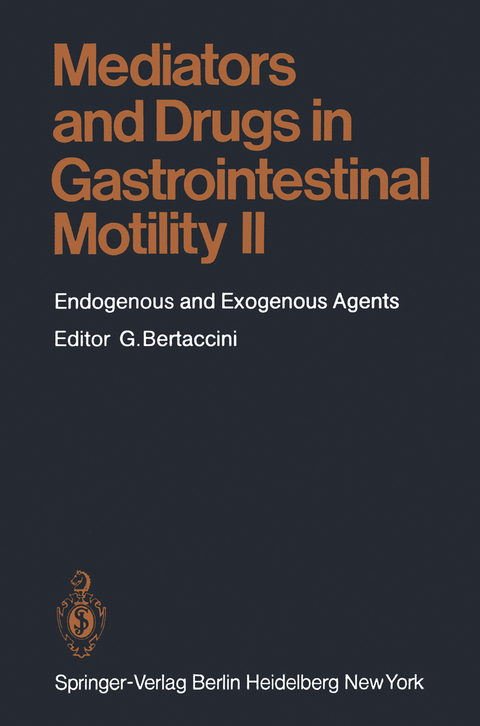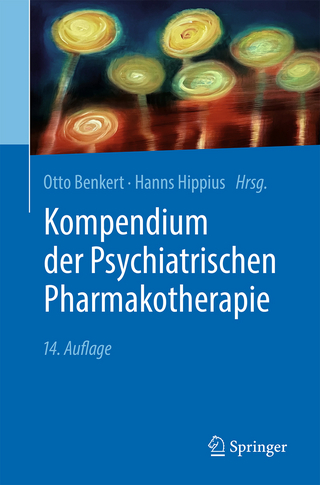
Mediators and Drugs in Gastrointestinal Motility II
Springer Berlin (Verlag)
978-3-642-68476-0 (ISBN)
This volume places more emphasis on endogenous mediators of gut motility than on drugs used to treat patients with deranged motility. In this respect it resembles most other books on gastroenterology, for while only a relatively small number of drugs are really useful for a rational therapy, a tremendous amount of data is available on neural and hormonal factors regulating the motility of the alimentary canal. Moreover, it must be considered that some of the drugs which can routinely be employed to modify deranged motility of the digestive system are represented by pure or slightly modified endogenous compounds (e. g. , cholecystokinin, its C terminal octapeptide and caerulein), and it is easy to foresee that their number is destined to increase in the near future. Other drugs are simply antagonists of physiological substances acting on specific receptors (e. g. , histamine H -blockers 2 and opioid compounds). The real explosion of research in this field and the extreme specialization often connected with the use of very sophisticated techniques and methodologies would probably have required a larger number of experts to cover some very specific fields from both an anatomical (lower esophageal sphincter, stomach, pylorus, small and large intestine) and a biochemical (hormones, candidate hormones, locally active substances, neurotransmitters etc. ) point of view.
1 Endogenous Substances Which Can Affect Gastrointestinal Motility.- General Introduction.- References.- 2a Peptides: Gastrointestinal Hormones.- Gastrin.- Cholecystokinin.- Secretin.- Gastric Inhibitory Polypeptide.- 2b Peptides: Candidate Hormones.- Substance P.- Motilin.- Neurotensin.- Bombesin.- 2c Peptides: Pancreatic Hormones.- Glucagon.- Insulin.- Pancreatic Polypeptide.- 2d Peptides: Other Hormones.- Vasopressin.- Calcitonin.- Coherin.- Thyrotropin-Releasing Hormone.- 2e Peptides: Locally Active Peptides ("Vasoactive Peptides").- Angiotensin.- Bradykinin.- 3 Amines: Histamine.- A. Introduction.- B. Activity on the Lower Esophageal Sphincter.- C. Action on the Stomach.- D. Gastric Emptying.- E. Action on the Intestine.- F. H2-Receptors.- G. Conclusions.- References.- 4 Acidic Lipids: Prostaglandins.- A. Introduction.- B. Occurrence, Formation, Release, and Degradation of Prostanoids.- C. Actions of Prostanoids on the Tone and Reactivity of Isolated Gastrointestinal Muscle.- D. Prostanoids and Gastrointestinal Nerves.- E. Prostanoid Antagonists and Different Types of Prostanoid Receptors.- F. Prostanoids and Peristalsis In Vitro.- G. Prostanoids and Motility In Vivo.- H. Prostanoids as Factors in Disordered Gastrointestinal Motility.- J. Beneficial Effects of Prostanoids in Disorders of Gastrointestinal Motility.- K. Conclusions.- References.- 5 Pharmacology of Adrenergic, Cholinergic, and Drugs Acting on Other Receptors in Gastrointestinal Muscle.- A. General Principles.- B. Drugs Acting on Adrenoceptors.- C. Cholinergic Receptors in the Gastrointestinal Tract.- D. Morphine and Drugs Acting on Opiate Receptors.- E. Laxatives and Constipating Agents.- F. Direct and Indirect Actions.- G. Serotonin Receptors and Antagonists.- H. Histamine Receptors andAntagonists.- J. Projections for the Future.- References.- 6 Hydrophilic Colloids in Colonic Motility.- A. Introduction.- B. The Nature of Stool Bulk and How it is Provided.- C. Actions of Fibre and of Operations on the Colon Muscle in Diverticular Disease.- D. Actions in Other Colonic Diseases.- E. Clinical Application of Fibre and Hydrophilic Colloid Additives.- References.- 7 Motility and Pressure Studies in Clinical Practice.- A. The Esophagus.- B. The Stomach.- C. The Small Intestine.- D. The Large Bowel.- E. Conclusions.- References.
| Erscheint lt. Verlag | 23.12.2011 |
|---|---|
| Reihe/Serie | Handbook of Experimental Pharmacology |
| Co-Autor | A. Bennett |
| Zusatzinfo | XVIII, 388 p. |
| Verlagsort | Berlin |
| Sprache | englisch |
| Maße | 170 x 244 mm |
| Gewicht | 707 g |
| Themenwelt | Medizin / Pharmazie ► Medizinische Fachgebiete ► Pharmakologie / Pharmakotherapie |
| Medizin / Pharmazie ► Pharmazie ► PTA / PKA | |
| Schlagworte | Agents • Drugs • Motility • Neurotransmitter • Opioid • Research |
| ISBN-10 | 3-642-68476-9 / 3642684769 |
| ISBN-13 | 978-3-642-68476-0 / 9783642684760 |
| Zustand | Neuware |
| Informationen gemäß Produktsicherheitsverordnung (GPSR) | |
| Haben Sie eine Frage zum Produkt? |
aus dem Bereich


